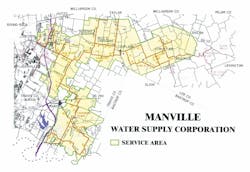About the author:
Nicole Haskins is director of sales for Tele-Works Inc. Haskins can be reached at [email protected] or 540.951.6462.
Manville Water Supply Corp. (WSC) in central Texas is not unlike many small and rural utilities: Providing water service for 7,600 customers spread out over a wide service area, the customer service staff found it challenging to keep up with high call demand. There were continual requests for account balance and transaction history, and customer service representatives had to process credit card payments manually over the phone, creating both time and security issues.
In the poor economic climate, delinquencies were on the rise, leading to an increased workload for service workers who had to shut off a larger number of customers for nonpayment. With long drive times between service addresses, the cost of shut-offs can prove to be substantial.
Manville WSC was searching for ways to cut down on manual processes and reduce its overall costs. An automated phone system, or interactive voice response (IVR), had been on the group’s wish list for years, but it could never justify the high upfront expense of traditional onsite equipment. Fortunately, new “cloud”-based technologies have emerged on the market, effectively changing the total-cost-of-ownership equation.
In the Cloud
With cloud-based, hosted IVR from Tele-Works, Manville WSC did not have to purchase and install hardware and software on site, but instead could leave those details to its partner. Tele-Works hosts the applications at a fraction of the cost compared to if the utility purchased a system itself. That offers significant benefits to a small utility like Manville WSC, which may not have the capital or IT resources necessary to install and maintain a system on site.
With hosted IVR, Manville WSC now is able to keep up with the high call demand from its customers. Customers have 24/7 account access to their balance and can make a payment by phone without having to speak to a customer service representative. Of course, customers who want to speak to a live person can transfer to a customer service representative during normal office hours.
The IVR system interacts with the utility’s customer information system (CIS) database in real time, meaning payments post immediately with 100% accuracy and no manual steps. By automatically processing payments in a hosted environment, utilities avoid the time and security issues associated with taking credit cards manually over the phone.
Each credit card payment can take up to 10 minutes to enter, process and post to the CIS. Not only does the utility avoid hundreds of hours of manual work, but the credit cards are processed in a completely secure environment to comply with payment card industry security regulations.
Manville WSC also delivers outbound notifications from its hosted system. With it, the utility now has a powerful tool to combat delinquencies and shut-offs by sending proactive past-due reminder calls to delinquent accounts. This final reminder gives customers an option to pay prior to having their service disconnected, and customers have the option to “press 2” to enter the IVR system and make a payment while on the call. Either way, the customer is informed at a very low cost to the utility.
Outbound notifications also can be sent to customers regarding other pertinent information (e.g., boil water notices, water restrictions, service interruptions and rate changes).
Unlocking Efficiencies
Manville WSC is benefitting greatly from its hosted IVR solution. In the first five months of use, the system handled almost 40% of all customer service calls, which amounts to about 55,000 minutes per year.
“Our call volume has been reduced tremendously,” said Customer Service Representative Vikki Blackman. “And we’ve recognized a significant time savings in automating our credit card payments.”
Customer service representatives now have more time to work on complicated customer issues instead of repetitive transactions. Their IVR system processes more than 10,000 payments and half a million dollars each year.
Perhaps the biggest cost savings have come from the automated past-due reminder calls. In the first month of use, Manville WSC was able to reduce its lock list by half. “A simple automated phone call has been very effective in saving time and money,” Blackman said.
IVR has been well received by Manville WSC customers too. The reminder phone calls are helping customers avoid the frustration and cost of having their service shut off. Furthermore, customers appreciate the “always-on” availability of the system.
In today’s economic climate, utilities are challenged to do more with less, but customers still expect quick and convenient service. Automation is the key to unlocking efficiencies, and delivering those services through the cloud makes them affordable and obtainable to small utilities.
For Manville WSC, its hosted IVR system is a powerhouse and paid for itself in the first month of use.
Download: Here
